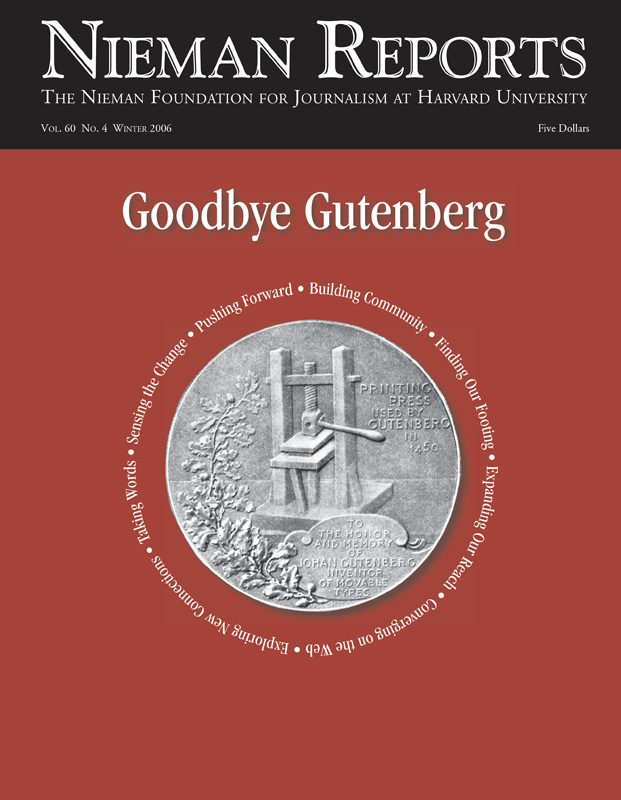In November 2005, a friend who works for Sina, one of the three major Web portals in China [see author's note], invited me to write a blog on the site. As executive news editor of a very well respected television channel in China—Phoenix Satellite Television, based in Hong Kong—I was very reluctant AUTHOR'S NOTE
The other two big ones are Sohu and Netease.to accept her offer. But given our friendship, I e-mailed her two articles I'd written for a Chinese newspaper, one about U.S. Secretary of Defense Donald Rumsfeld's visit to China and the other one about the bird flu. I was unwilling to waste time learning how to make a blog work, so I asked her to just post them on a blog they created for me.
The next day, I opened my blog. I was astonished; my blog already had 80,000 hits and 100 comments. The reaction to what I'd written was universally positive. And my words were sparking debates about some of the points I'd made, and these debates were taking place right on my blog. For me, it was love at first sight; I loved my blog's interactivity, something traditional media were not able to offer. I named it "Rose Garden" and started to write on it nearly every other day. By now I have more than two million regular readers, and some get a lot of their words into my blog by regularly posting their comments.
What's been created is a small (or maybe not so small) community.
The news programs I oversee are among the most heavily watched on Phoenix TV, where I've worked for almost 10 years. Our programs are available to those living in Southern China, and the Chinese government allows them to be watched by those who stay in high-priced hotels (primarily populated by foreigners) and in residential buildings where foreigners live in China. Our audience in China numbers more than 100 million people. This privately owned, 24-hour news channel also reaches Chinese who pick up the signal by satellite in countries around the world. Those who watch it tell us they turn to it for its more objective and balanced presentation and faster delivery than state-owned TV channels. Even the top Chinese leaders have told people that they watch it every day.
What I've discovered is that my blog offers people without access to my programs a way to be connected with news. Among Sina's more than 3,000 blogs (some of them written by China's celebrities), mine is the only one focused on analyzing news and political affairs, domestic and international. Perhaps this is what helps my blog to be among the portal's top 100 favorites. I try to give this community detailed information—background stories behind news—along with my point of view. On my blog, I am able to go beyond the limitation of time I have on my TV programs. On it, I also have more freedom and can receive immediate feedback.
During my time at the TV station, I have gone with almost all of China's top leaders when they have visited foreign countries. At the end of 2005, during the Asia-Pacific Economic Cooperation meeting, I wrote in my blog about what I'd seen and heard and felt during my trip there with Chinese President Hu Jintao. My words attracted a very large volume of traffic to my blog and taught me that people are bored by typical reports that come from traditional (and in the case of China, official) media. What interests them are the more human aspects of their government leaders—forbidden ground in China's news media. When I wrote columns for a newspaper in China, I was told not to write anything about the leaders. Hong Kong's news media, including Phoenix, had fewer restrictions of this sort, but with limited airtime and not a lot of pictures, I was not able to tell some of the more vivid stories from this trip. On my blog, I could, and did so with words and photographs I took.
In China, the Internet enjoys relatively greater freedom than other media. Even so, three articles I posted on my blog vanished without notice. The Sina editor told me the government's Internet monitors took them away. This also happened with my blog on the Phoenix Web site, where sometimes I've not been able even to post my article. The editor at Phoenix told me this was because of a key word search that revealed my piece, and this is also how those other articles disappeared.
What's written on blogs can also lead me to news stories. Only a few days after I started my blog, someone in the city of Harbin wrote the following message to me: "It was rumored that the city government was going to shut down the water supply and people started to panic." These words reminded me of the explosion in a refinery plant at the neighboring city about 10 days earlier and how they might have caused the river to become polluted. I checked with my local contacts, and they confirmed that the local government issued the notice but without giving a reason. I sent a crew to the scene, and the result was a big story that we broadcast long before other media were reporting about this disaster. Only after China's official news media, Xinhua, confirmed the pollution later that day did other news media go with the story.
According to organizations in China that track the growth of Internet use and blogging there, close to 125 million people use the Internet and, by the end of summer, bloggers were said to be reaching 75 million of them. As happens everywhere, most people who blog express their thoughts and describe their lives, but some in China use blogs to release the kind of information usually handled by journalists.
Blogs, News and China
Some people believe that with a blog anyone can do a reporter's job and do it with greater speed and more firsthand information. From what I've observed, bloggers can provide a lot of information and sometimes give clues that will lead to a big story, but few bloggers have the time and sources to go further with the reporting; often they also lack the ability to be a neutral observer, as journalists try to be.
My experience has shown me the value of having a blog featured on a well-respected and popular portal. With one of my recent articles, before Sina put the article on its front page only 2,000 visitors had seen it. Within two days, it received 80,000 hits.
Phoenix TV launched my blog on its portal in March as a way of attracting more hits and more advertisements. (News video produced by Phoenix can go on my blog, whereas on Sina it is still only text and images because Sina hasn't launched video and audio uploads for its bloggers.) For Phoenix TV, my blog serves another function: On it, I can extend my reporting—for example, by writing about political leaders, the Cultural Revolution, and even the debate about democracy (subjects not permitted by China's press authorities in traditional media). To do this, however, I need to try to skip using certain key words in my writing. And sometimes other bloggers and Web sites will link to them.
Although Phoenix is based in Hong Kong, the company decided to put the portal server in mainland China; by doing this, the speed is faster for those who reside in China. But that means the Web site must obey the government's regulations, just as other local portals do. These regulations don't give the Web site's reporters or anyone (other than Xinhua reporters) the right to conduct interviews; only Xinhua stories and quotes from other print media's stories can be used (and what is used must fall within the regulations). But on my blog, I am able to write about and show video from news I report, even in some cases when, for some reason, the story did not appear on our TV programs.
RELATED WEB LINKS
OhMyNews
Read Rose's blogs:
· Sina (in Chinese)
· Phoenix TV (in Chinese)
We are left to wonder whether in the near future China will allow citizen-journalism Web enterprises like Korea's OhMyNews to exist. If so, Chinese people would have more access to information about what is happening in their country and in the world. However, the restrictive changes Chinese officials recently instituted for the news media—both domestic and foreign—indicate they fear the power and the influence of the Internet.
Luwei (Rose) Luqiu, a 2007 Nieman Fellow, is executive news editor of Phoenix Satellite Television. Her blogs, in Chinese, can be found at the Sina and Phoenix TV Web sites.
The other two big ones are Sohu and Netease.to accept her offer. But given our friendship, I e-mailed her two articles I'd written for a Chinese newspaper, one about U.S. Secretary of Defense Donald Rumsfeld's visit to China and the other one about the bird flu. I was unwilling to waste time learning how to make a blog work, so I asked her to just post them on a blog they created for me.
The next day, I opened my blog. I was astonished; my blog already had 80,000 hits and 100 comments. The reaction to what I'd written was universally positive. And my words were sparking debates about some of the points I'd made, and these debates were taking place right on my blog. For me, it was love at first sight; I loved my blog's interactivity, something traditional media were not able to offer. I named it "Rose Garden" and started to write on it nearly every other day. By now I have more than two million regular readers, and some get a lot of their words into my blog by regularly posting their comments.
What's been created is a small (or maybe not so small) community.
The news programs I oversee are among the most heavily watched on Phoenix TV, where I've worked for almost 10 years. Our programs are available to those living in Southern China, and the Chinese government allows them to be watched by those who stay in high-priced hotels (primarily populated by foreigners) and in residential buildings where foreigners live in China. Our audience in China numbers more than 100 million people. This privately owned, 24-hour news channel also reaches Chinese who pick up the signal by satellite in countries around the world. Those who watch it tell us they turn to it for its more objective and balanced presentation and faster delivery than state-owned TV channels. Even the top Chinese leaders have told people that they watch it every day.
What I've discovered is that my blog offers people without access to my programs a way to be connected with news. Among Sina's more than 3,000 blogs (some of them written by China's celebrities), mine is the only one focused on analyzing news and political affairs, domestic and international. Perhaps this is what helps my blog to be among the portal's top 100 favorites. I try to give this community detailed information—background stories behind news—along with my point of view. On my blog, I am able to go beyond the limitation of time I have on my TV programs. On it, I also have more freedom and can receive immediate feedback.
During my time at the TV station, I have gone with almost all of China's top leaders when they have visited foreign countries. At the end of 2005, during the Asia-Pacific Economic Cooperation meeting, I wrote in my blog about what I'd seen and heard and felt during my trip there with Chinese President Hu Jintao. My words attracted a very large volume of traffic to my blog and taught me that people are bored by typical reports that come from traditional (and in the case of China, official) media. What interests them are the more human aspects of their government leaders—forbidden ground in China's news media. When I wrote columns for a newspaper in China, I was told not to write anything about the leaders. Hong Kong's news media, including Phoenix, had fewer restrictions of this sort, but with limited airtime and not a lot of pictures, I was not able to tell some of the more vivid stories from this trip. On my blog, I could, and did so with words and photographs I took.
In China, the Internet enjoys relatively greater freedom than other media. Even so, three articles I posted on my blog vanished without notice. The Sina editor told me the government's Internet monitors took them away. This also happened with my blog on the Phoenix Web site, where sometimes I've not been able even to post my article. The editor at Phoenix told me this was because of a key word search that revealed my piece, and this is also how those other articles disappeared.
What's written on blogs can also lead me to news stories. Only a few days after I started my blog, someone in the city of Harbin wrote the following message to me: "It was rumored that the city government was going to shut down the water supply and people started to panic." These words reminded me of the explosion in a refinery plant at the neighboring city about 10 days earlier and how they might have caused the river to become polluted. I checked with my local contacts, and they confirmed that the local government issued the notice but without giving a reason. I sent a crew to the scene, and the result was a big story that we broadcast long before other media were reporting about this disaster. Only after China's official news media, Xinhua, confirmed the pollution later that day did other news media go with the story.
According to organizations in China that track the growth of Internet use and blogging there, close to 125 million people use the Internet and, by the end of summer, bloggers were said to be reaching 75 million of them. As happens everywhere, most people who blog express their thoughts and describe their lives, but some in China use blogs to release the kind of information usually handled by journalists.
Blogs, News and China
Some people believe that with a blog anyone can do a reporter's job and do it with greater speed and more firsthand information. From what I've observed, bloggers can provide a lot of information and sometimes give clues that will lead to a big story, but few bloggers have the time and sources to go further with the reporting; often they also lack the ability to be a neutral observer, as journalists try to be.
My experience has shown me the value of having a blog featured on a well-respected and popular portal. With one of my recent articles, before Sina put the article on its front page only 2,000 visitors had seen it. Within two days, it received 80,000 hits.
Phoenix TV launched my blog on its portal in March as a way of attracting more hits and more advertisements. (News video produced by Phoenix can go on my blog, whereas on Sina it is still only text and images because Sina hasn't launched video and audio uploads for its bloggers.) For Phoenix TV, my blog serves another function: On it, I can extend my reporting—for example, by writing about political leaders, the Cultural Revolution, and even the debate about democracy (subjects not permitted by China's press authorities in traditional media). To do this, however, I need to try to skip using certain key words in my writing. And sometimes other bloggers and Web sites will link to them.
Although Phoenix is based in Hong Kong, the company decided to put the portal server in mainland China; by doing this, the speed is faster for those who reside in China. But that means the Web site must obey the government's regulations, just as other local portals do. These regulations don't give the Web site's reporters or anyone (other than Xinhua reporters) the right to conduct interviews; only Xinhua stories and quotes from other print media's stories can be used (and what is used must fall within the regulations). But on my blog, I am able to write about and show video from news I report, even in some cases when, for some reason, the story did not appear on our TV programs.
RELATED WEB LINKS
OhMyNews
Read Rose's blogs:
· Sina (in Chinese)
· Phoenix TV (in Chinese)
We are left to wonder whether in the near future China will allow citizen-journalism Web enterprises like Korea's OhMyNews to exist. If so, Chinese people would have more access to information about what is happening in their country and in the world. However, the restrictive changes Chinese officials recently instituted for the news media—both domestic and foreign—indicate they fear the power and the influence of the Internet.
Luwei (Rose) Luqiu, a 2007 Nieman Fellow, is executive news editor of Phoenix Satellite Television. Her blogs, in Chinese, can be found at the Sina and Phoenix TV Web sites.



